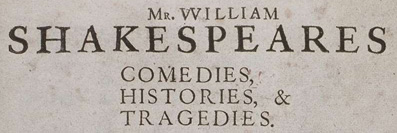Spelling

Spelling in early modern texts like Shakespeare's is very different from our own standardized spelling. Even in the short passage above, we can see several differences from our own rules and practices.
For example, "go" is spelled "goe," "artery" appears as "Artire" and "I'll" becomes "Ile" -- the latter two examples also highlighting the period's different usages of capitalization and contractions respectively.
Moreover, "v" is substituted for "u" -- as in "Vnhand me Gentlemen" -- and "u" for "v" -- as in "By Heau'n" and "nerue." Early modern texts also used what is called a "long s" -- as in the word "Ghost" above.
* * * * *
Even Shakespeare's own name is spelled differently on the title pages of various plays:

First Folio (1623)
|
|
|
 King Lear (1608) |
|
![]()
2 Henry IV (1600)
* * * * * * * * * *
Back to "What is a Folio?"
 .
.